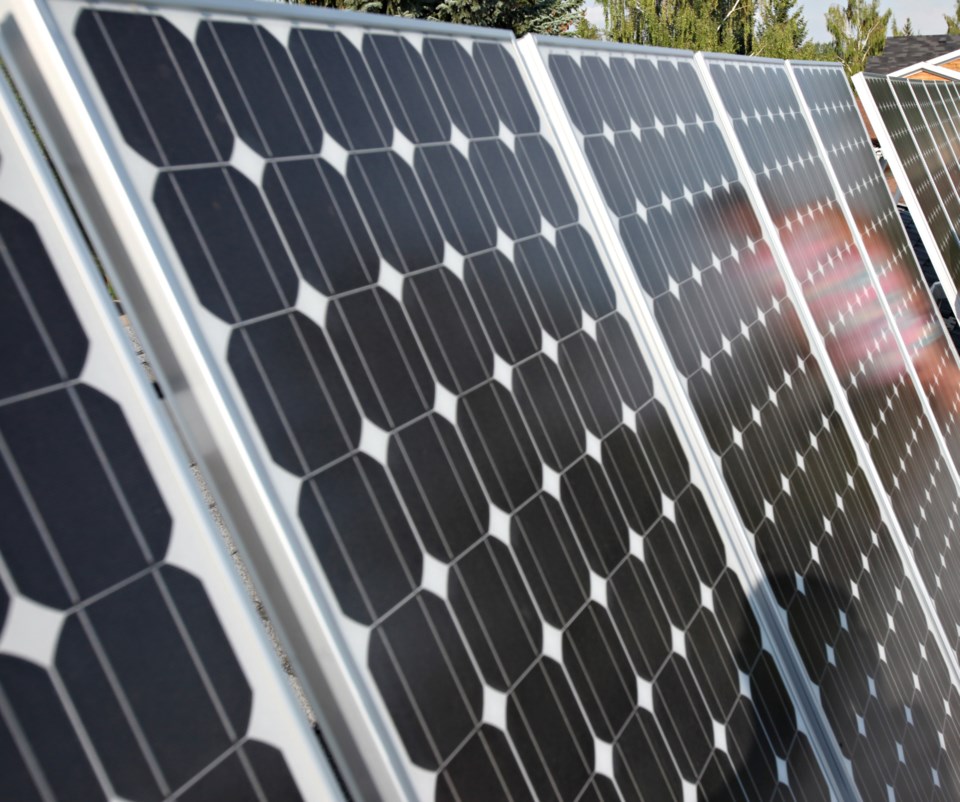A proposed solar project aimed at cutting massive electricity costs generated by the local sewage treatment plant was not selected for funding in a province-wide challenge, but the partners remain hopeful it will come to fruition.
The Town of Black Diamond, Westend Regional Sewage Services Commission and AEnergy Capital applied to the Municipal Community Generation Challenge to receive grant funding to help cover the cost of a $3.7 million small-scale solar farm south of the upper lagoons that would offset the sewage treatment facility’s electricity costs.
The project was one of 39 short-listed last summer, requiring a proposal to be submitted in the fall. A letter from the Municipal Climate Change Action Centre and Alberta Innovates informed the commission earlier this month that the project was not selected.
Black Diamond Coun. Brian Marconi, and commission vice-chairman, said he’s disappointed.
“A lot of hard work was put together in putting that application in so it was disappointing to get the rejection,” he said. “Until we get the feedback it’s hard to say what the problem was with the application.”
The provincial challenge invited communities to create sustainable solutions towards low carbon electricity generation that will result in developing renewable generation products that reduce greenhouse gas emissions, diversify the economy and allow the data and knowledge to be transferred to other communities. The action centre has committed $7 million and Alberta Innovates $3 million for those projects selected.
Black Diamond’s solar project proposes a 1.7 megawatt solar photovoltaic system where generated electricity is sold to the grid and the money is used to reduce utility costs of the sewage treatment plant, as required by the Small Scale Regulation.
The commission, a not-for-profit corporation that operates the sewage treatment plant which services Black Diamond and Turner Valley, will continue working with the Town and AEnergy to seek funding opportunities for the solar farm, said Marconi.
“It’s a good project, it’s just a matter of finding funding from whatever level of government we can find it from,” he said. “We will sit down and talk to AEnergy to continue looking to see where other grants may be available. We’re trying to forward think, but it’s difficult when you can’t find the money.”
Marconi said some grant dollars may be available after both the provincial and federal governments recently announced more funding for infrastructure this year.
“What it’s for and how we access it are questions that have to be sought out,” he said. “It would be nice to see this project completed to at least get our operational costs down because, going forward with the lagoon upgrade, it’s going to be a very costly operation and electricity is a very big component of that. The equipment that has to go in there is going to eat up a lot of power.”
Black Diamond Parks and Recreation manager Les Quinton, who was instrumental in getting solar installed on town buildings, said the sewage treatment plant uses more power than the Oilfields Regional Arena and Scott Seaman Sports Rink combined. He said $85,000 was budgeted for Westend’s electrical costs last year.
In addition to seeking grant funding, Quinton said the partners may also explore financing options for the project.
“We will see if it’s feasible for us to do or not,” he said. “We would probably have to take out a debenture and we could use money from the power sold to the grid to pay whoever we’re getting financing from.”
While the project would use green power to lower the Town’s carbon footprint, Quinton said it’s not a priority in the wake of COVID-19.
“With everything that’s going on right now it has taken a backseat, but it’s still something we would like to pursue,” he said. “It really now depends on what the costs are going to look like and how it’s going to get paid for.”
For updated information, follow our COVID-19 special section for the latest local and national news on the coronavirus pandemic, as well as resources, FAQs and more.




